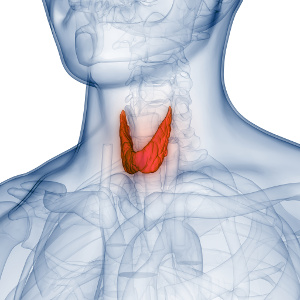Hypothyroidism can be helped with selenium
 Hashimoto’s thyroiditis is the most common underlying cause of hypothyroidism. It is characterized by extreme fatigue, weight gain, and a number of other symptoms. Hashimoto’s is an autoimmune condition where antibodies attack the thyroid gland. Many people who get treatment for their disease don’t improve, on the contrary. According to a meta-analysis published in Medicine, however, selenium supplementation appears to be able to reduce the autoimmune reactions and the body’s production of the different antibodies. Selenium helps control the thyroid function but also serves as an antioxidant that protects the thyroid gland against oxidative stress.
Hashimoto’s thyroiditis is the most common underlying cause of hypothyroidism. It is characterized by extreme fatigue, weight gain, and a number of other symptoms. Hashimoto’s is an autoimmune condition where antibodies attack the thyroid gland. Many people who get treatment for their disease don’t improve, on the contrary. According to a meta-analysis published in Medicine, however, selenium supplementation appears to be able to reduce the autoimmune reactions and the body’s production of the different antibodies. Selenium helps control the thyroid function but also serves as an antioxidant that protects the thyroid gland against oxidative stress.
The rate of Hashimoto’s thyroiditis has gone up in the past decades, especially among women. It is an insidious disease that is characterized by elevated levels of antibodies like TPOAb and TgAb that attack the thyroid gland. The body’s production of thyroid hormones in the affected areas also decreases due to the autoimmune reactions.
The thyroid gland is the organ with the highest concentration of selenium compared with its size. Therefore, science has long assumed that this trace element is important for the structure and function of this gland and that a selenium deficiency can lead to autoimmune reactions. Still, studies have shown conflicting results with regard to whether or not selenium can influence the body’s antibody production. The scientists therefore wanted to look closer at this in their new meta-analysis.
Long-term selenium supplementation lowers the body’s antibody production
By trawling different databases such as PubMed, Web of Science, EMBASE, Scopus, and the Cochrane Library, the researchers found seven controlled studies, including 342 patients with Hashimoto’s disease. In the studies, the patients had received 50-200 micrograms of selenium per day or matching placebo for 3-6 months. According to the results, no significant changes were observed in levels of the different antibodies after three months. However, after six months, a significant drop was observed in levels of TPOAb and TgAb.
Based on their findings, the scientists conclude that selenium supplementation for six months can lower serum levels of these two antibodies. Other studies suggest that daily supplementation with 200 micrograms of selenium has the optimal effect with regard to lowering antibodies and improving the structure of the thyroid gland.
How does selenium affect the thyroid gland’s functions and state?
It’s commonly known that the thyroid gland needs iodine to make T4 (thyroxine) that has four iodine atoms and T3 (triiodothyronine) that has three iodine atoms. T4 is the inactive thyroid hormone that is converted into active T3 in the body’s different tissues. The process involves different selenium-containing enzymes (deiodinases) that remove one iodine atom from T4, thereby turning it into active T3.
Selenium is also a part of the powerful GPX antioxidants that protect the thyroid gland against oxidative stress caused by free radicals. The thyroid gland is a very active organ with a huge flow of blood passing through it, which means it is exposed to massive quantities of free radicals. The free radical load is made worse by stress, alcohol, medicine, mercury and other environmental toxins.
Free radicals are highly aggressive molecules that attack our cells and tissues, unless they are neutralized by protective antioxidants. One of the hallmarks of Hashimoto’s disease is oxidative stress with an excess of free radicals.
Due to its role as an antioxidant, selenium also helps counteract the different inflammatory processes that characterize autoimmune reactions.
Beware that it may take up to six months before selenium has the optimal effect, and it is normally a good idea to continue supplementing. People who are selenium-deficient risk that therapies with synthetic T4 hormone (Eltroxin and Euthyrox) may not work properly because of the lack of selenium-containing enzymes to help the conversion of T4 into T3.
Thyroid disorders and selenium deficiency
- Around 1-2 percent of the world’s population is believed to suffer from Hashimoto’s disease
- In Denmark, the disease affects around 500,000 people
- Most people with hypothyroidism have not been diagnosed with the condition
- Many people who get treatment end up feeling worse
- An estimated one billion people worldwide lack selenium
- The soil in Europe is low in selenium and many people lack the nutrient, even if they eat a healthy and balanced diet
- There is a possible link between the growing rate of thyroid disorders and the widespread problems with selenium deficiency
References:
Kong Xiang-Qi et al. Clinical efficacy of selenium supplementation in patients with Hashimoto´s thyroiditis: A systematic review and meta-analysis. Medicine 2023
Lutz Schomburg. Selenium Deficiency Due to Diet, Pregnancy, Severe Illness or COVID-19 – A Preventable Trigger for Autoimmune Disease. International Journal of Molecular Sciences. 2021
Aparna Shreenath. Selenium Deficiency. StatPearls. May 6, 2019
Pernille Lund. Har du problemer med dit stofskifte? Ny Videnskab 2015
Search for more information...
- Created on .








